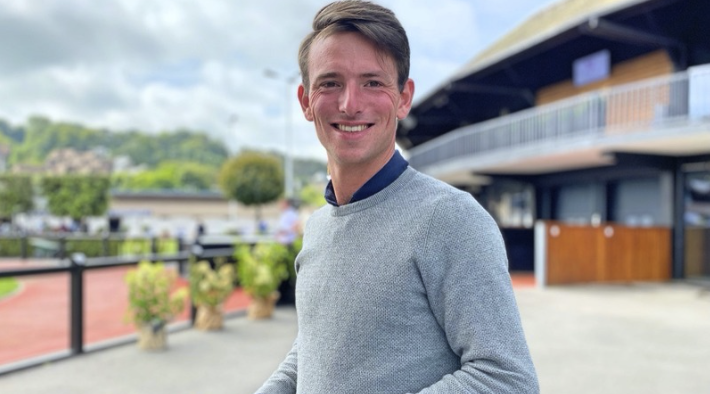Tim Donworth, a young Irish trainer based in Chantilly for nearly three years, shares his experience and modern vision of racehorse training with EQUIMETRE. Having grown up in a family of breeders in Ireland and after working alongside renowned names like Nicolas Clément and Jean-Claude Rouget, he combines tradition with innovation. Donworth relies on technologies like EQUIMETRE to optimize his horses’ performance, with nearly 70 wins to his credit, including a dozen Black Type races.
In this interview, he discusses his approach, the results achieved, and the challenges ahead to continue evolving in the racing industry.
What prompted you to introduce data into your training technique? How do you incorporate EQUIMETRE into your training approach? What’s your favorite parameter?
Find out all the answers in this interview, and here’s the full vidéo!
Can you introduce yourself?
My name is Tim Donworth, and I’m based in Chantilly. In October, it will be three years since I’ve been working my horses here. I’m originally from Ireland, where my parents are breeders. I came to France to work as an assistant for Nicolas Clément and later for Jean-Claude Rouget.
Can you tell us about your training method?
I believe we’ve made a good start so far. We’ve had nearly 70 winners, including around 10 Black Type victories. I couldn’t ask for more at this point!
You always learn little things from everyone along the way. I was fortunate to work with Nicolas Clément, so I train with a similar galloping style as him. With Jean-Claude Rouget, I also learned a great deal. We try to get our horses to the races as early as possible, around two years old, following a rather classic training approach.
What prompted you to introduce data into your training technique?
I think it’s essential to evolve with the times. Some trainers using EQUIMETRE had achieved great results. We were open to trying new things. We constantly evolve and adapt our methods.
I’m pleased with the results so far. My two assistants handle the data management and collection. I instruct them on which horse to monitor and what work to carry out. It has been very beneficial in evaluating the gallops.
How do you incorporate EQUIMETRE into your training approach?
First, you know exactly what times the horses have run. You gain a better understanding of what happens throughout the entire workout. Sometimes, horses may seem to go very fast, but you wonder if they didn’t start too slowly.
What’s your favorite parameter?
For me, the most important data is recovery time. It’s a good indicator. When the recovery is good, and you’re in the right race, the horse runs well and doesn’t disappoint afterward. It’s a key factor in our current method.
It varies from horse to horse. Some naturally have slower recovery times, while others recover faster. When recovery time falls below 50%, and then 40%, it indicates that we are close to peak fitness.
Can you give a concrete example of a decision made based on the data?
The best example of using data was last spring when the horses were a bit sick.
I had my doubts, but it didn’t show in their daily work. With EQUIMETRE, we noticed their recovery times were off. After testing one or two horses in a race, we’ve seen that they didn’t perform to their potential.
That was an important moment for me. Sometimes with two-year-olds, you think you need two or three more workouts, but then you see their recovery is really good. It’s an excellent indicator.
How do you see the future of training in horse racing?
I think we need to evolve in several ways, especially because there seem to be increasing staffing issues across different countries, training centers, and industries. We will have to address these concerns.
I believe trainers will increasingly use technology to gather data on horses, which generally helps achieve the set goals.
What are your current goals?
The goal is always to have more winners than the previous year. Many of our three-year-olds will be out in September and October, and we’ll try to secure all the victories we can.
Keywords: Arioneo, EQUIMETRE, Chantilly, Donworth, racing, recovery, horses, trainers, Deauville, tracks, technology, innovation.

